
HOUSTON (AP) — Kamala Harris and Beyoncé ignited a Houston rally with a double-barreled argument against Donald Trump on Friday, with the superstar telling the Democratic nominee’s biggest crowd ever that it was “time to sing a new song” as Harris warned that her GOP opponent was dead set on further eroding women’s rights.
The rally was set in reliably Republican Texas, to highlight the growing medical fallout from the state’s strict abortion ban, but the message was intended to register in the political battleground states, where Harris is hoping that the aftereffects from the fall of Roe v. Wade will spur voters to turn out to support her quest for the presidency.
“For all the men and women in this room, and watching around the country, we need you,” Beyoncé said in a rare political appearance. The megastar’s speech was lofty, joyful and optimistic — a temper to the seriousness of the topic and of the message Harris was there to bring.

“I’m here as a mother, a mother who cares deeply about the world my children and all of our children live in,” Beyoncé said. “A world where we have freedom to control our bodies, a world where we’re not divided.”
Harris came out to huge cheers. She told the crowd that Trump had erased half a century of hard-fought progress when he appointed the Supreme Court justices who overturned Roe and touched off a growing healthcare crisis.

She listed off downstream effects she sees from various bans. Women who never intended to end a pregnancy are suffering devastating complications when they can’t get care. They have fewer options, and fewer medical students are choosing to specialize in women’s health.
“For anyone watching from another state, if you think you are protected from Trump abortion bans because you live in Michigan, Pennsylvania, Nevada, New York, California, or any state where voters or legislators have protected reproductive freedom, please know: No one is protected,” Harris warned. “Because a Donald Trump national ban will outlaw abortion in every single state.”
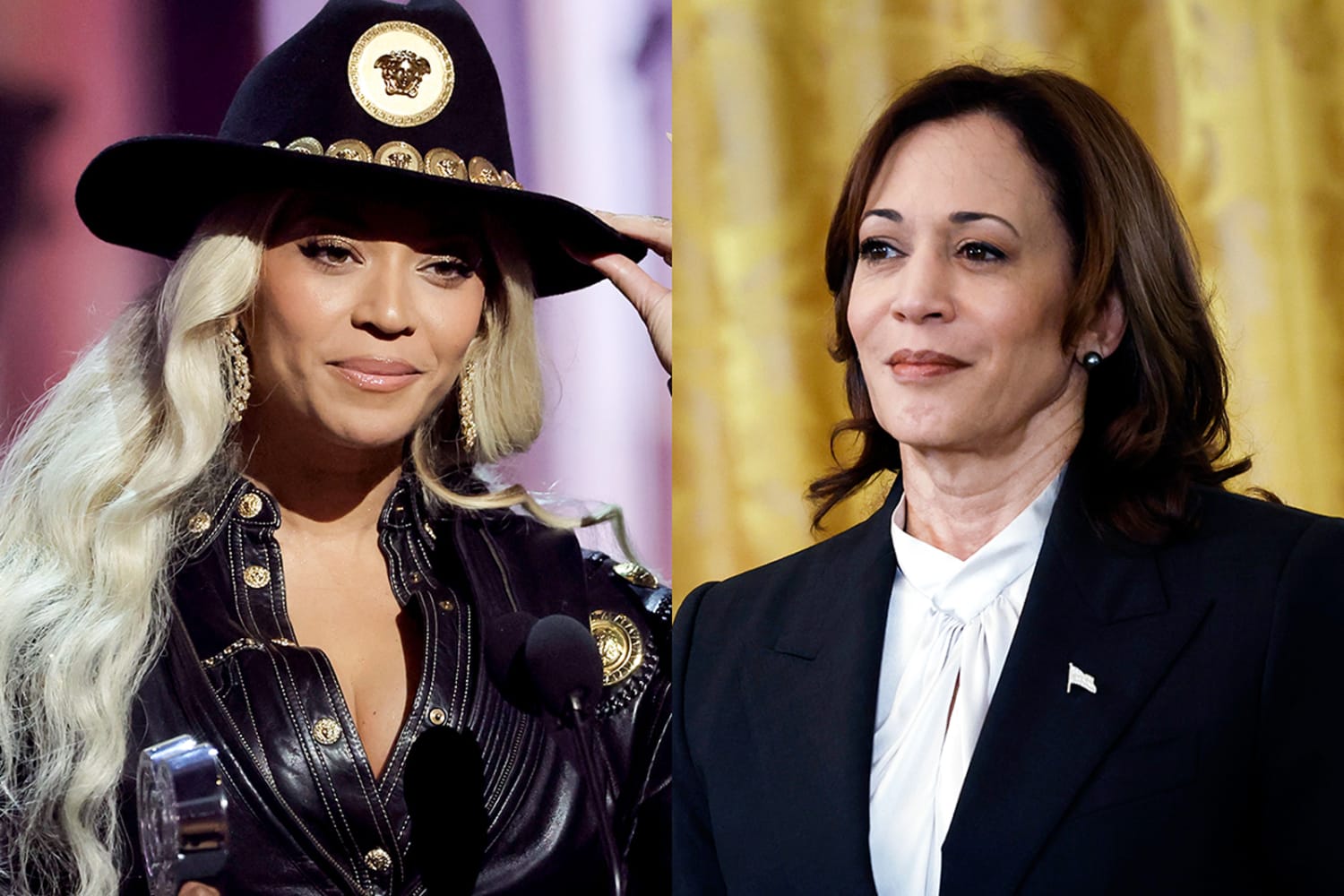
“All that to say, elections matter,” she said.
Trump has been inconsistent in his message to voters on abortion and reproductive rights, though he’s said he’d veto a national abortion ban. He has repeatedly shifted his stance and offered vague, contradictory and at times nonsensical answers to questions on an issue that has become a major vulnerability for Republicans in this year’s election.
Trump was also in Texas Friday, where he predicted he’d break records for the number of people deported from the United States if he wins the election. He taped a podcast with Joe Rogan before heading to a rally in Traverse City, Michigan, where he took the stage three hours late.
Harris was joined at the rally by women who have nearly died from sepsis and other pregnancy complications because they were unable to get proper medical care. Some of them have already been out campaigning for Harris and others have told their harrowing tales in campaign ads that seek to show how the issue has ballooned into something far bigger than the right to end an unwanted pregnancy.

Since abortion was restricted in Texas, the state’s infant death rate has increased, more babies have died of birth defects and maternal mortality has risen.
The crowd waited for hours, wearing flashing red, white and blue LED bracelets as “trust women” and “freedom” flashed on big screens between acts.
“Sometimes they forget about us because we’re a Republican state,” Rhonda Johnson, who has been living in Houston for 19 years, said. “But I’m glad she’s here.”
Reproductive rights, the economy and LGBTQ issues were key reasons for Yannick Djomatchoua in his decision to support Harris and wait in the hours-long line to see her. “It’s very personal,” he said, adding that he knew friends who had to make difficult decisions due to the state’s abortion restrictions.
Harris’ campaign has taken on Beyoncé’s 2016 track “Freedom” as its anthem, and the message dovetails with the vice president’s emphasis on reproductive freedom. Beyoncé was joined by her mother, Tina Knowles, and her former bandmate Kelly Rowland, who all spoke about Harris’ historic candidacy and a dream of a more united nation.
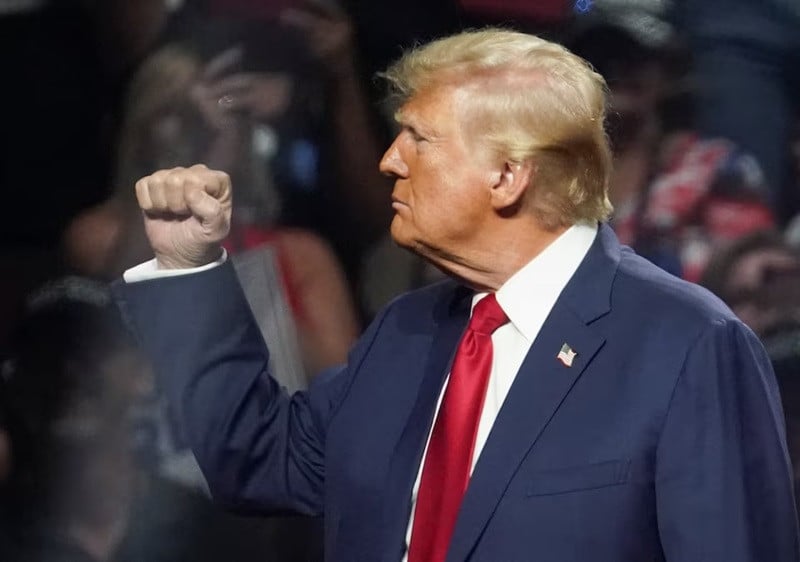
“Our voices sing a chorus of unity,” Beyoncé said. “They sing a song of dignity and opportunity — are y’all ready?”
Harris was also joined by country legend Willie Nelson, who sang some of his greatest hits, including “On the Road Again.”
“Hey, how are y’all doing?” the 91-year-old Nelson asked the crowd. “Are we ready to say Madam President?”
Increasingly, in 14 states with strict abortion bans, women cannot get medical care until their condition has become life-threatening. In some states, doctors can face criminal charges if they provide medical care.
Democrats warn that a winnowing of rights and freedoms will only continue if Trump is elected. Republican lawmakers in states across the U.S. have been rejecting Democrats’ efforts to protect or expand access to birth control, for example.

“In America, freedom is not to be given. It is not to be bestowed. It is ours. By right. And that includes the fundamental freedom of a woman to make decisions about her own body and not have the government telling her what to do,” Harris said.
There is some evidence to suggest that abortion rights may drive women to the polls as it did during the 2022 midterm elections. Voters in seven states, including some conservative ones, have either protected abortion rights or defeated attempts to restrict them in statewide votes over the past two years.
About 6 in 10 Americans think their state should generally allow a person to obtain a legal abortion if they don’t want to be pregnant for any reason, according to a July poll from The Associated Press-NORC Center for Public Affairs Research.
Democrats also hope Harris’ visit will give a boost to Rep. Colin Allred, who is making a longshot bid to unseat Republican Texas Sen. Ted Cruz. Allred said Friday that if you vote to overturn a woman’s constitutional right, as Cruz did, then you should lose your job.
Texas encapsulates the post-Roe landscape. Its strict abortion ban prohibits physicians from performing abortions once cardiac activity is detected, which can happen as early as six weeks or before.
As a result, women are increasingly suffering worse medical care. That’s in part because doctors cannot intervene unless a woman is facing a life-threatening condition, or to prevent “substantial impairment of major bodily function.”
“Texas’ abortion bans unleashed by Donald Trump almost cost me my life and have left me with physical and emotional scars,” said Ondrea Cummings, who lost her 16-week baby and nearly died from sepsis when she couldn’t get care fast enough.
“I never thought I would have this type of personal experience. If it can happen to me, it can happen to anyone.”
Jeff Bezos killed Washington Post endorsement of Kamala Harris, paper reports

The Washington Post said Friday that it will not endorse a candidate in the presidential election this year — or ever again — breaking decades of tradition and sparking immediate criticism of the decision.
But the newspaper also published an article by two staff reporters revealing that editorial page staffers had drafted an endorsement of Democratic nominee Kamala Harris over GOP nominee Donald Trump in the election.
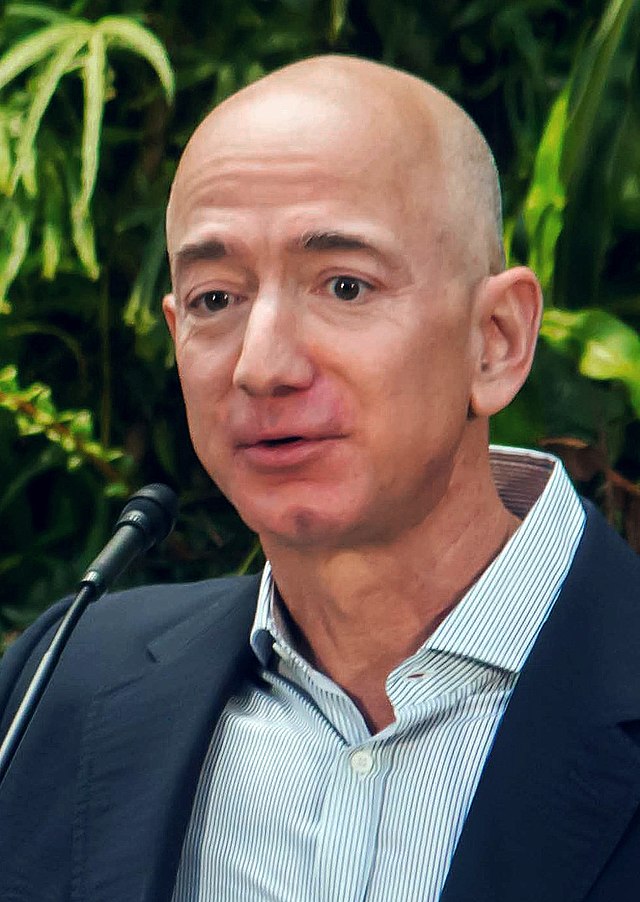
“The decision not to publish was made by The Post’s owner — Amazon founder Jeff Bezos,” the article said, citing two sources briefed on the events.
Trump, while president, had been critical of the billionaire Bezos and the Post, which he purchased in 2013.
The newspaper in 2016 and again in 2020 endorsed Trump’s election opponents, Hillary Clinton and President Joe Biden, in editorials that condemned the Republican in blunt terms.
In a 2019 lawsuit, Amazon claimed it had lost a $10 billion cloud computing contract with the Pentagon to Microsoft because Trump had used “improper pressure … to harm his perceived political enemy” Bezos.
The Post since 1976 had regularly endorsed candidates for president, except for the 1988 race. All those endorsements had been for Democrats.

In a statement to CNBC, when asked about Bezos’ purported role in killing the endorsement, Post chief communications officer Kathy Baird said, “This was a Washington Post decision to not endorse, and I would refer you to the publisher’s statement in full.”
The Post on Friday evening published a third article, signed by opinion columnists for the newspaper, who said, “The Washington Post’s decision not to make an endorsement in the presidential campaign is a terrible mistake.”
“It represents an abandonment of the fundamental editorial convictions of the newspaper that we love, and for which we have worked a combined 218 years,” the column said. “This is a moment for the institution to be making clear its commitment to democratic values, the rule of law and international alliances, and the threat that Donald Trump poses to them — the precise points The Post made in endorsing Trump’s opponents in 2016 and 2020.”
CNBC has requested comment from Amazon, where Bezos remains the largest shareholder.

Post publisher and chief executive Will Lewis, in an article published online explaining the decision, wrote, “The Washington Post will not be making an endorsement of a presidential candidate in this election. Nor in any future presidential election.”
“We are returning to our roots of not endorsing presidential candidates,” Lewis wrote.
“We recognize that this will be read in a range of ways, including as a tacit endorsement of one candidate, or as a condemnation of another, or as an abdication of responsibility,” he wrote.
“That is inevitable. We don’t see it that way. We see it as consistent with the values The Post has always stood for and what we hope for in a leader: character and courage in service to the American ethic, veneration for the rule of law, and respect for human freedom in all its aspects.”
Seven of the 13 paragraphs of Lewis’ article either quoted at length or referred to Post Editorial Board statements in 1960 and 1972 explaining the paper’s rationale for not endorsing presidential candidates in those years, which included its identity as “an independent newspaper.”
Lewis noted that the paper had endorsed Jimmy Carter in 1976 “for understandable reasons at the times” — which he did not identify.
“But we had it right before that, and this is what we are going back to,” Lewis wrote.
“Our job as the newspaper of the capital city of the most important country in the world is to be independent,” he wrote. “And that is what we are and will be.”
Post editor-at-large Robert Kagan, a member of the paper’s opinions section, resigned following the decision, multiple news outlets reported.

More than 10,000 reader comments were posted on Lewis’ article, many of them blasting the Post for its decision and saying they were canceling their subscriptions.
“The most consequential election in our country, a choice between Fascism and Democracy, and you sit out? Cowards. Unethical, fearful cowards,” wrote one comment. “Oh, and by the way, I’m canceling my subscription, because you are putting business ahead of ethics and morals.”
The announcement came days after Mariel Garza, the head of The Los Angeles Times’ editorial board, resigned in protest after that paper’s owner, Patrick Soon-Shiong, decided against running a presidential endorsement.
“I am resigning because I want to make it clear that I am not okay with us being silent,” Garza told the Columbia Journalism Review. “In dangerous times, honest people need to stand up. This is how I’m standing up.”
Soon-Shiong, like Bezos, is a billionaire.
Marty Baron, the former editor of The Washington Post, called that paper’s decision “cowardice, with democracy as its casualty.”
″@realdonaldtrump will see this as an invitation to further intimidate owner @jeffbezos (and others),” Baron wrote. “Disturbing spinelessness at an institution famed for courage.”
The Washington Post Guild, the union that represents the newspaper’s staff, in a statement posted on the social media site X said it was “deeply concerned that The Washington Post — an American news institution in the nation’s capital — would make a decision to no longer endorse presidential candidates, especially a mere 11 days ahead of an immensely consequential election.”
“The message from our chief executive, Will Lewis — not from the Editorial Board itself — makes us concerned that management interfered with the work of our members in Editorial,” the Guild said in the statement, which noted the paper’s reporting about Bezos’ role in the decision.
“We are already seeing cancellations from once loyal readers,” the Guild said. “This decision undercuts the work of our members at a time when we should be building our readers’ trust, not losing it.”
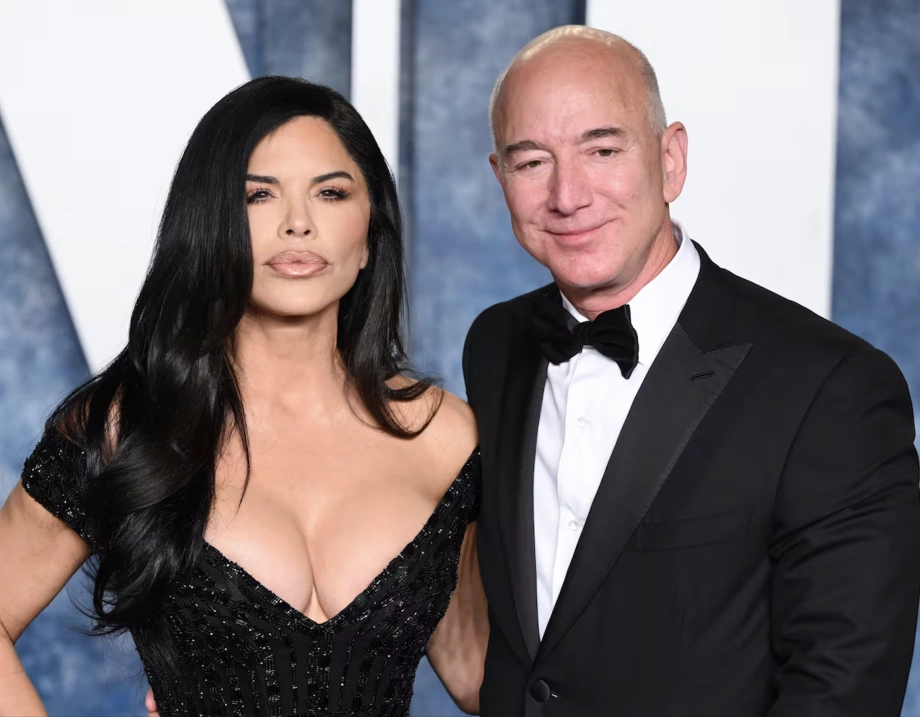
Former Post reporters Bob Woodward and Carl Bernstein, whose stories about the Watergate break-in during the Nixon administration won the newspaper a Pulitzer Prize for Public Service, in a statement said, “We respect the traditional independence of the editorial page, but this decision 11 days out from the 2024 presidential election ignores the Washington Post’s own overwhelming reportorial evidence on the threat Donald Trump poses to democracy.”
“Under Jeff Bezos’s ownership, the Washington Post’s news operation has used its abundant resources to rigorously investigate the danger and damage a second Trump presidency could cause to the future of American democracy and that makes this decision even more surprising and disappointing, especially this late in the electoral process,” Woodward and Bernstein said.
Post columnist Karen Attiah, in a post on the social media site Threads, wrote, “Today has been an absolute stab in the back.”
“What an insult to those of us who have literally put our careers and lives on the line to call out threats to human rights and democracy,” Attiah wrote.
Rep. Ted Lieu, a Democrat from California, in his own tweet on the news wrote, “The first step towards fascism is when the free press cowers in fear.”
Trump in August told Fox Business News that Bezos called him after the Republican narrowly escaped an assassination attempt in July at a campaign rally in western Pennsylvania.
“He was very nice even though he owns The Washington Post,” Trump said of Bezos.
Bezos last posted on X on July 13, hours after the assassination attempt.
“Our former President showed tremendous grace and courage under literal fire tonight,” Bezos wrote in that tweet. “So thankful for his safety and so sad for the victims and their families.”
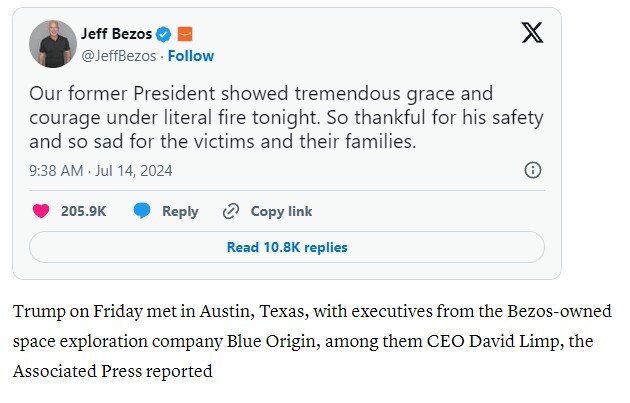
Trump really could be the next president. So it’s time to call his instincts what they are: fascist
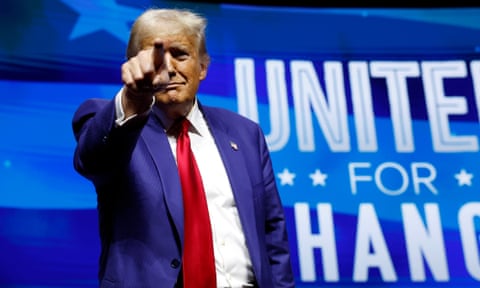
There is a good chance that in 10 days’ time, Americans will elect the first fascist president of the United States. It sounds hyperbolic, it sounds hysterical. Indeed, for exactly those reasons, many of his opponents long held back from using that word about Donald Trump. But the hour is late. Voting is already under way. It’s time to spell out what Trump has said and done, what he threatens to do, what he is.
Put aside the personal grossness, on display again in recent days with his reference to the size of the late Arnold Palmer’s manhood. Put aside the fact that he’s a twice-impeached, four times indicted, convicted felon who has been found liable by a court for rape. Put aside the latest accusations from a former model who says she met Trump through Jeffrey Epstein, and that the former president groped her in what she believed was a “twisted game” between the two men.
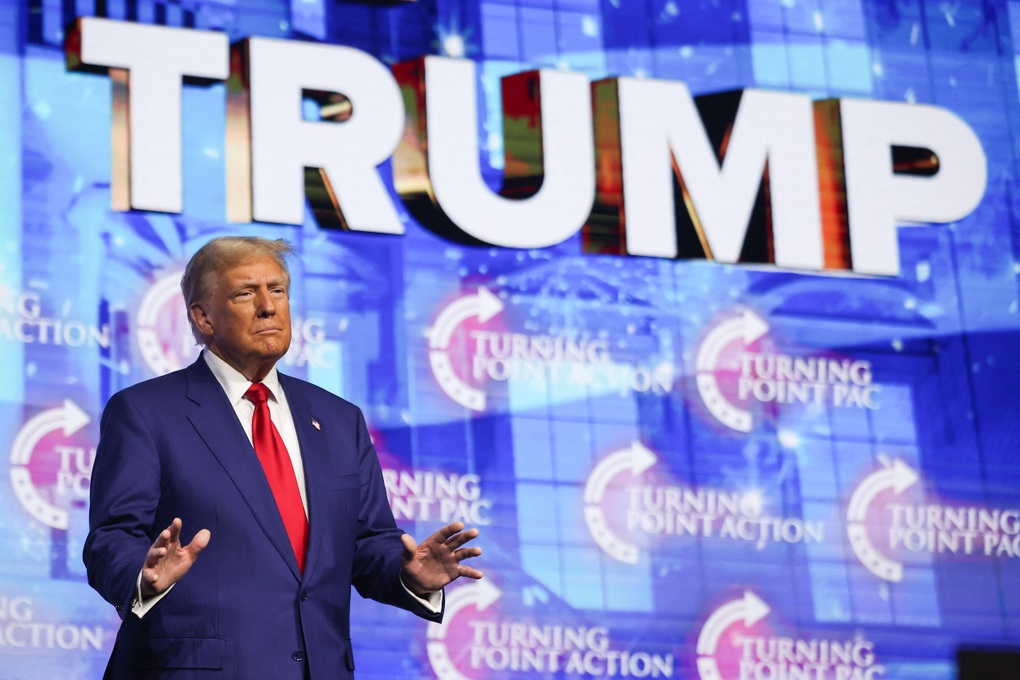
Focus instead on the F-word. In recent days, the taboo on that word has been broken, starting with a warning from a former head of the US military, Mark Milley, that the president he once served is a “fascist to the core”. In an interview a few days later, the former House speaker Nancy Pelosi told me she shared that view, and Kamala Harris herself has spoken in similar terms. But this week came perhaps the most detailed, and therefore persuasive, deployment of that term.
It came from a man who worked exceptionally closely with Trump, serving as his White House chief of staff: General John Kelly. Like Milley, Kelly did not use the word “fascist” to mean racist or really rightwing, as some loosely throw around that term, but rather to describe Trump’s attitude to power. Indeed, Kelly took pains to be precise.
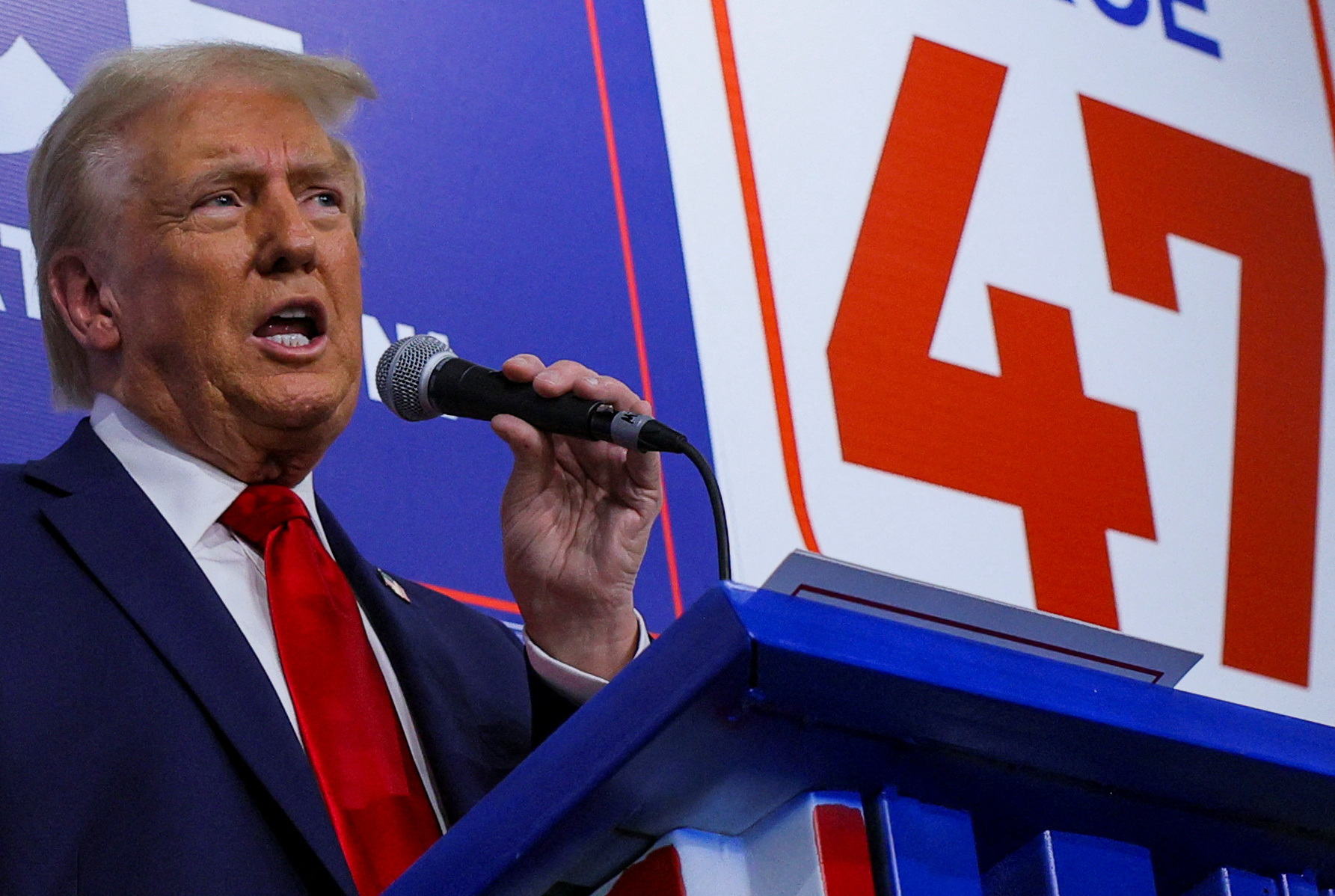
In an interview with the New York Times, he read aloud a definition of fascism: “It’s a far-right authoritarian, ultranationalist political ideology and movement characterized by a dictatorial leader, centralized autocracy, militarism, forcible suppression of opposition, belief in a natural social hierarchy,” he said, adding that Trump fitted that description. “In my experience, those are the kinds of things that he thinks would work better in terms of running America.”
It’s not a stretch to speak of “autocracy”. Kelly and others have told how Trump believed all power should reside in him, how he bridled at the insistence by senior officials in the government or military, including those he called “my generals”, that their loyalty was to the constitution rather than to him personally. Trump saw that and all such constraints on his authority, including the law, as irritating – if not illegitimate.
That was troubling enough in his first term, but it would be more alarming in a second. For one thing, Trump will not repeat his mistake of appointing lieutenants who believe their duty is to serve the country rather than him, even if that means thwarting his will. Next time, he will be surrounded by loyalists. Some of them have been remarkably candid about their plans. In the words of one, Russell T Vought, speaking of how Trump aims to take direct control of every corner of the US federal government, “What we’re trying to do is identify the pockets of independence and seize them.”.

An obvious early target will be the department of justice. Trump has left little doubt that he will not respect that body’s independence. Instead he will use it as a weapon to get the “retribution” he has promised by prosecuting his enemies. What’s more, a second-term Trump will be emboldened by an extraordinary ruling of the supreme court. In July that bench, remade in his image with three Trump-appointed judges, granted the president sweeping legal immunity.
What especially alarms the retired generals is Trump’s repeated threats to use the US military against American citizens, to crush dissent. When the Black Lives Matter protests erupted in Washington DC in 2020, Trump sent in the national guard, but now he talks, explicitly, about going much further, promising to use the army against those he calls “the enemy from within”. When pressed to say who he had in mind, he did not cite terrorists or criminals but Adam Schiff, a Democratic congressman from California.
The same instinct animates his serial threats to the free press. “CBS should lose its license,” Trump posted on social media last week, after the network displeased him with an interview with Harris: “60 Minutes should be immediately taken off the air.” Earlier he had called for ABC’s licence to be “terminated” because he didn’t like the way his debate with Harris had gone. Presidents cannot block TV networks on a whim, but they do appoint the board that hands out broadcast licences – so it’s not an empty threat.
This, remember, is a man who gushes like a teenager in his admiration for Vladimir Putin, Xi Jinping and Kim Jong-un, but rarely has a good word to say for America’s democratic allies. This is a man who has promised to be a dictator “on day one”. What more does he have to do to tell us who he is, short of dressing up in jackboots and doing a Hitler salute? And before you dismiss that as a joke, recall Kelly’s confirmation that, more than once, Trump spoke positively of the Nazi dictator: “You know, Hitler did some good things, too,” he would say.
Given all this, it should be shocking that Trump is even a contender for the White House, let alone one who, polls suggest, is locked in a tie with his opponent. But too many Americans are fed up with high prices and fearful about immigration; too many blame the incumbent Democratic administration and see Harris as part of that status quo. In that context it didn’t help that, when asked if she would have done anything differently from Joe Biden these last four years, Harris replied, “Not a thing that comes to mind.”
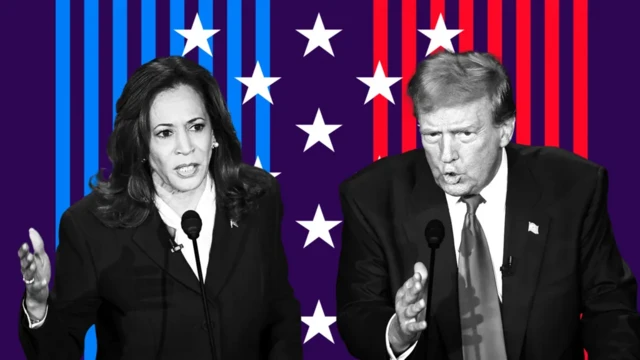
In her closing argument, Harris is rightly focusing on the threat Trump poses to democracy and freedom. But she has to make that threat ever more concrete. Polls show she is losing ground among Black and Hispanic voters, especially men. Why not, as the Atlantic’s Ron Brownstein has argued, remind those voters that Trump threatens to cut federal funding to police departments that don’t implement “stop-and-frisk”, a practice that disproportionately targets Black men? Or that Trump plans a door-to-door operation against undocumented immigrants, a programme of mass deportation that could see the rounding up of 11 million people? This is not a niche issue: there are 4 million young US citizens with at least one undocumented parent. And if you’re wondering where they would all go, recall that Stephen Miller, one of Trump’s closest advisers, has said that “illegals” awaiting deportation will be sent to massive internment camps.
On Monday, Donald Trump will address a rally at Madison Square Garden. Others have already noted the uncomfortable echo of the vast America First rally held in that same venue in 1939, when an earlier variant of American fascism was at its height. The US, and the world, got lucky then, as that movement was steadily eclipsed by events. On 5 November, America and the world desperately need to get lucky again – and time is running out.
















:max_bytes(150000):strip_icc():focal(749x0:751x2):format(webp)/baby-gets-diagnosed-with-rare-mitochondrial-disease-102925-9-3e855762e0a648ddaaa5b85eb3787ffc.jpg?w=1200&resize=1200,0&ssl=1)




:max_bytes(150000):strip_icc():focal(793x549:795x551)/Ariana-Grande-011424-94a5837634ee47a191c399a1c5536465.jpg?w=1200&resize=1200,0&ssl=1)











:max_bytes(150000):strip_icc():focal(999x0:1001x2)/catherine-ohara-013026-7-4b5b413a646d4f15a1fd15ac8b933811.jpg?w=1200&resize=1200,0&ssl=1)








